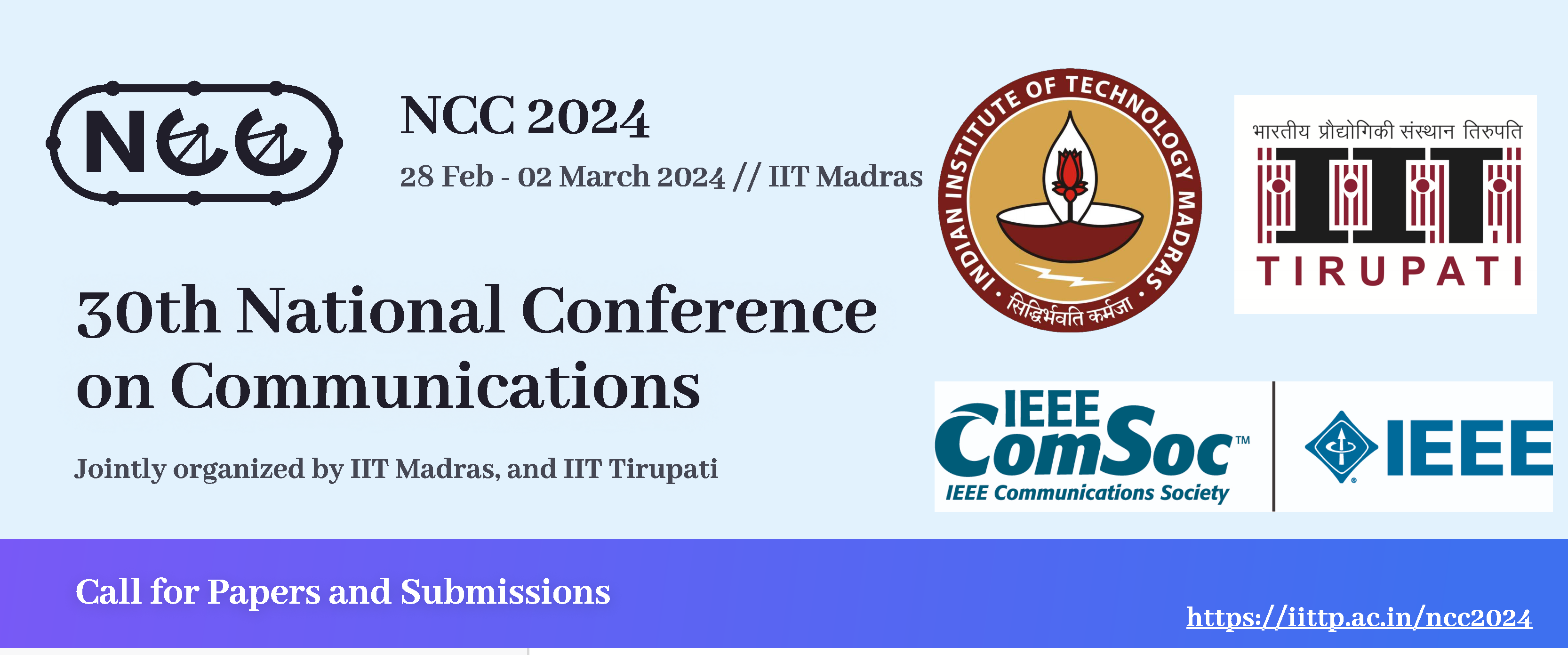
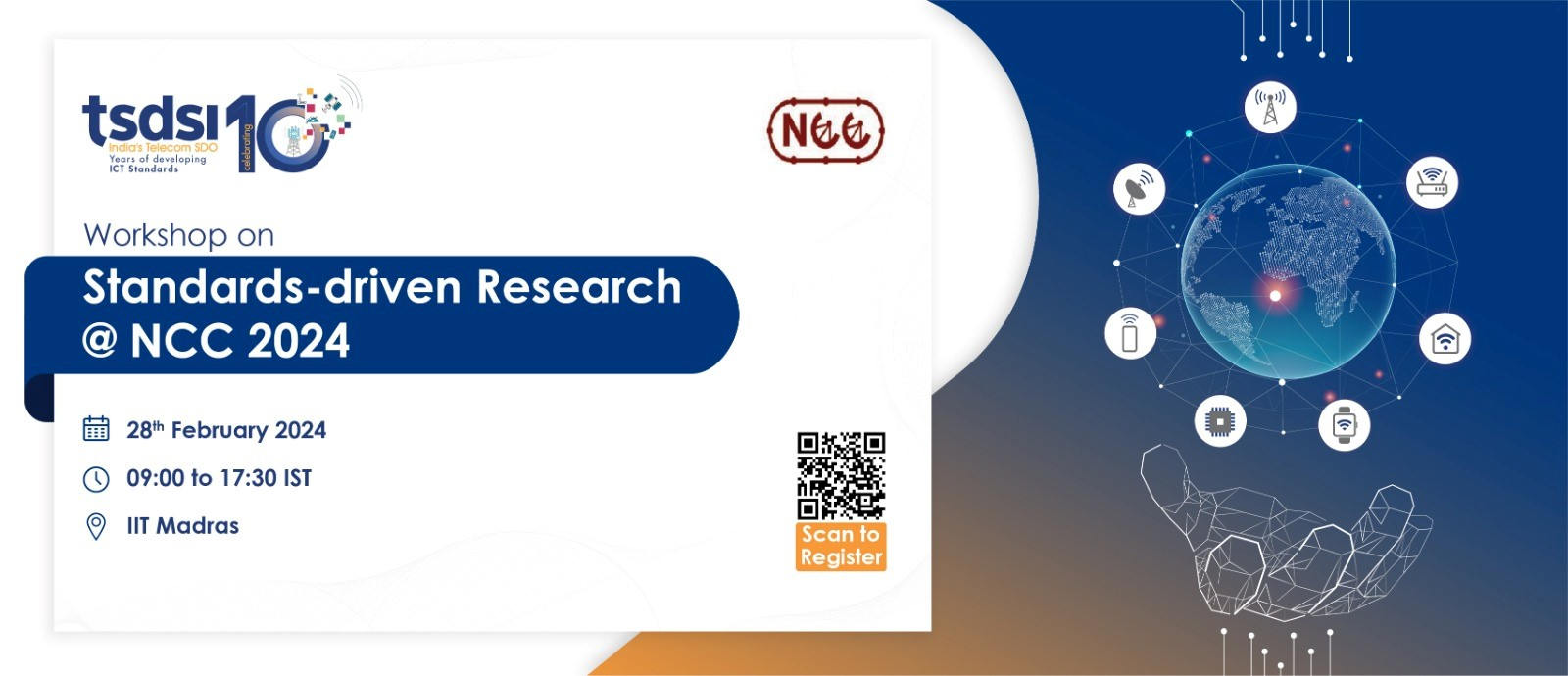

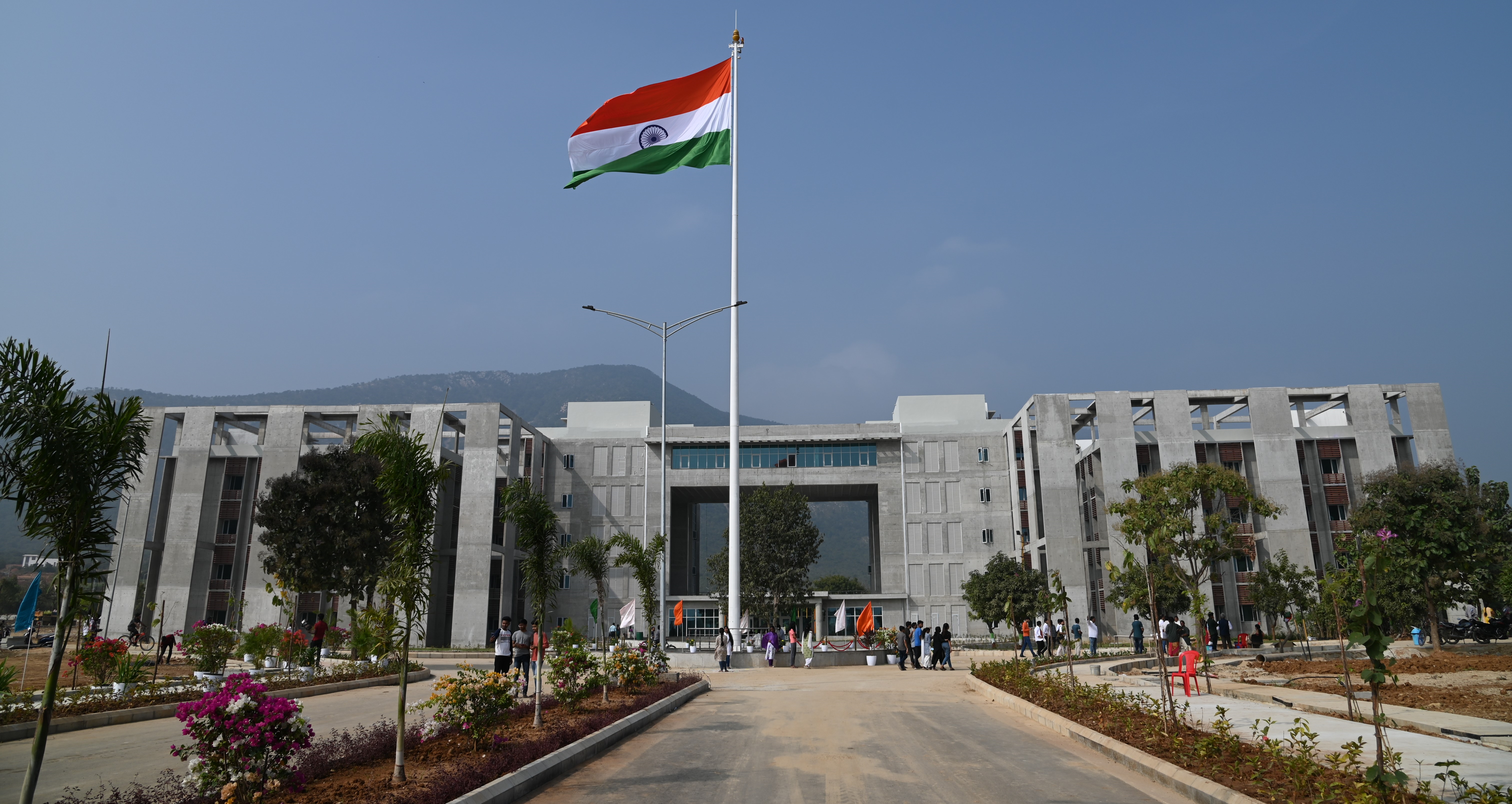







The National Conference on Communications (NCC) is the flagship conference of India in the area of Communications, Signal Processing and Networks. It has been organized every year, starting from the year 1995, by the Joint Telematics Group (JTG) of the Indian Institutes of Technology and the Indian Institute of Science. More information on the previous editions of NCC can be found at http://www.ncc.org.in/. The Thirtieth National Conference on Communications (NCC-2024) will be jointly organized by Indian Institute of Technology Madras, and Indian Institute of Technology Tirupati, during 28th February- 2nd March 2024. NCC-2024 will be held as in-person event at IIT Madras. The conference will feature technical paper sessions, poster sessions, tutorials, workshops and plenary and invited talks by renowned researchers from around the globe. "Accepted papers will be submitted for inclusion into IEEE Xplore subject to meeting IEEE Xplore’s scope and quality requirements". Prospective authors are encouraged to submit their original research findings to the following and other related areas: click here.
The 30th NCC will be jointly organized by IIT Madras and IIT Tirupati. The conference will be offline and will be held at IIT Madras during 2024. The organizers welcome you to NCC 2024 to be held for the third time in the Chennai is the Capital of Tamil Nadu State which lies in the southern part of east coast of Bay of Bengal. Many of the historical places are around Chennai with many temples representing the traditional temple architecture of South India.
Prospective authors are encouraged to submit original technical papers that have not been published or submitted elsewhere for publication in the conference proceedings and for presentation in the conference. Submitted papers in two columns format should be FOUR to SIX A4 size pages in length, should use font size no smaller than 10 points, and have margins on all four sides as per the IEEE conference format. All submitted papers will be double blind peer-reviewed for technical content and scope by a technical program committee. The paper submission process will be handled through EDAS.
Detailed information on technical paper submission, tutorials, workshops, invited talks, accommodation and travel will be posted on the conference website.
Title: Playing with optical waves for efficient and ultrafast signal processing
Abstract:This talk will provide an introduction and overview of the field of optical signal processing, with a focus on a highly efficient general methodology using linear phase-only light-wave manipulations. This methodology has enabled the realization of many novel and greatly enhanced signal analysis and processing functionalities for a wide range of applications, from high-speed telecommunications to sensing...

Title: Learning to Beamform in Integrated Sensing and Communication Systems
Abstract:Integrated sensing and communications (ISAC) are envisioned to be an integral part of future wireless systems. In this talk, we will discuss model-drivel neural model to design transmit precoders for ISAC systems to jointly optimize a certain sensing and communications quality of service (QoS). In particular, we pose the problem of learning transmit precoders from uplink pilots and echoes as a function estimation problem and we model and parameterise this function using a neural model...
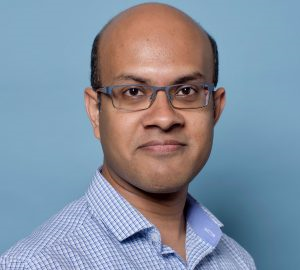
Title: NFV and SDN for Next Generation Telecommunication Networks
Abstract:This talk will provide an overview of two recent trends in computer networking, namely, Network Function Virtualization (NFV) and Software Defined Networking (SDN). The talk will then talk about how the ideas of NFV and SDN are being used in telecom networks like 5G networks today. We will discuss some recent research from our group that addresses the challenges in designing telecom networks using the principles of NFV and SDN. We will also provide some lessons on how to design future telecom networks to avoid such challenges.
Title: Going Beyond the Known: Detecting Unknown Categories in Computer Vision
Abstract:Supervised learning, the harbinger of machine learning over the last decade, has had tremendous impact across application domains in recent years. However, the notion of a static trained machine learning model that identifies one among a few pre-specified set of classes is becoming increasingly limiting, as these models are deployed in changing and evolving environments...

Title: Fast Convergence of Decentralized FedAvg in the Interpolation Regime
Abstract:This talk focuses on answering theoretical questions related to solving Federated Learning (FL) problems using a well known algorithm called Federated Average (FedAvg). FL is a distributed learning paradigm where multiple clients each having access to a local dataset collaborate with a server to solve a joint problem. The FedAvg algorithm is characterized by partial client participation and local updates at each client...

Title: Communication and Radar Sensing using Pulsones
Abstract:6G presents an opportunity to reflect on the fundamentals of wireless communication, as it becomes more and more difficult to estimate channels in high-mobility/high-Doppler environments when information signaling and signal processing are carried out in the traditional time-frequency (TF) domain. Also, the convergence of communication and radar sensing in 6G and beyond (inspired by the developments in intelligent transportation systems)...
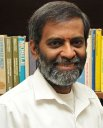
Title: Distributed Compression in the Era of Machine Learning
Abstract:Many applications from camera arrays to sensor networks require efficient compression and processing of correlated data, which in general is collected in a distributed fashion. While information-theoretic foundations of distributed compression are well investigated, the impact of theory in practice has been somewhat limited. As the field of data compression is undergoing a transformation with the emergence of learning-based techniques, machine learning is becoming an important tool to reap the long-promised benefits of distributed compression...

Title: Six Blind Men of Indostan: Theory and Applications of Distributed Inference
Abstract:Distributed inference refers to the synergistic combination of information gathered by various knowledge sources and sensors to provide inference regarding a phenomenon of interest. This fascinating field has evolved over the past four decades and is being applied to a wide variety of fields such as military command and control, robotics, image processing, air traffic control, medical diagnostics, pattern recognition, environmental monitoring, IoT and smart cities...
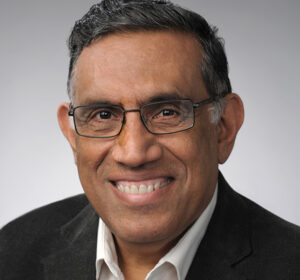
Title: Optical Transceivers for Data Center Networking and AI Hardware
Abstract:Data centers are becoming the backbone of digital economy as they support all sorts of applications. Furthermore, with recent advancements in AI/ML tools, including generative AI and its applications, the demand for increase in numbers and capacities of data centers is now growing explosively. By year 2030, it is projected that more than 8% of the global electricity demand would come from the data centers...
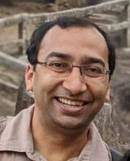
Title: On Optimal Distributed Sampling and Detection of Poisson Processes
Abstract:We study the problem of distributed sampling and detection of remote point processes. A remote source, modelled as a homogeneous Poisson counting process (PCP) and with one of two possible intensity values, is observed at multiple remote observers in noise. The observers have a ‘sampling’ constraint which limits them from forwarding the entirety of their observations to a centralized fusion center, or ‘detector’. More precisely, the observers or samplers can remain active or ON for a fixed fraction of time over a fixed, known and finite time window...
